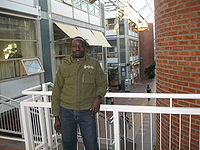Difference between revisions of "User:Misah Natumanya"
| Line 1: | Line 1: | ||
[[Image:misah.jpg|thumb|200px|left]] | [[Image:misah.jpg|thumb|200px|left]] | ||
| − | My name is Misah Natumanya. I am a Ugandan by nationality, a Munyankore by tribe which lives in South Western Uganda.I am a master's student at the Institute for Languages and Communication Studies at NTNU. Back home in Uganda,I am a teaching Assistant in the Institute of Languages, Makerere University. I teach Runyakitara and some linguistics courses at undergraduate level. I enjoy morpho-syntax, morpho-semantics, phonology, translation and lexicography. | + | My name is Misah Natumanya. I am a Ugandan by nationality, a Munyankore by tribe which lives in South Western Uganda.I am a master's student at the Institute for Languages and Communication Studies at NTNU. Back home in Uganda,I am a teaching Assistant in the Institute of Languages, Makerere University. I teach Runyakitara and some linguistics courses at undergraduate level. I enjoy morpho-syntax, morpho-semantics, phonology, translation and lexicography.I have a rich experience in translation from English to Runyankore-Rukiga, and I am among the key editors of the first ever Runyankore-Rukiga monolingual dictionary locally known as "Kashoboorozi ya Runyankore-Rukiga". Am also an author of Runyankore-Rukiga primary school thematic curriculum books, with Macmillan Publishers. I like linguistics with all my heart and soul,and believe me,this natural language database,will further our linguistic analysis. |
| − | + | Currently, I am writing a thesis about '''Applicative Constructions in Runyankore-Rukiga''', It is basically on '''Runyankore-Rukiga Applicative Morphology'''(different forms and allomorphs of the applicative affix in RR),'''Classification and Object relations in RR applicative constructions''', and the possible '''co-occurrences of the applicative morpheme with other verb derivational morphemes'''. I also intend to establish and show '''how the applicative morpheme licences an additional argument to the verb''', where I will use '''Lexical Functional Grammar'''(LFG). | |
| − | + | ||
| − | Currently, I am writing a thesis about | + | |
Revision as of 00:08, 13 November 2011
My name is Misah Natumanya. I am a Ugandan by nationality, a Munyankore by tribe which lives in South Western Uganda.I am a master's student at the Institute for Languages and Communication Studies at NTNU. Back home in Uganda,I am a teaching Assistant in the Institute of Languages, Makerere University. I teach Runyakitara and some linguistics courses at undergraduate level. I enjoy morpho-syntax, morpho-semantics, phonology, translation and lexicography.I have a rich experience in translation from English to Runyankore-Rukiga, and I am among the key editors of the first ever Runyankore-Rukiga monolingual dictionary locally known as "Kashoboorozi ya Runyankore-Rukiga". Am also an author of Runyankore-Rukiga primary school thematic curriculum books, with Macmillan Publishers. I like linguistics with all my heart and soul,and believe me,this natural language database,will further our linguistic analysis.
Currently, I am writing a thesis about Applicative Constructions in Runyankore-Rukiga, It is basically on Runyankore-Rukiga Applicative Morphology(different forms and allomorphs of the applicative affix in RR),Classification and Object relations in RR applicative constructions, and the possible co-occurrences of the applicative morpheme with other verb derivational morphemes. I also intend to establish and show how the applicative morpheme licences an additional argument to the verb, where I will use Lexical Functional Grammar(LFG).
